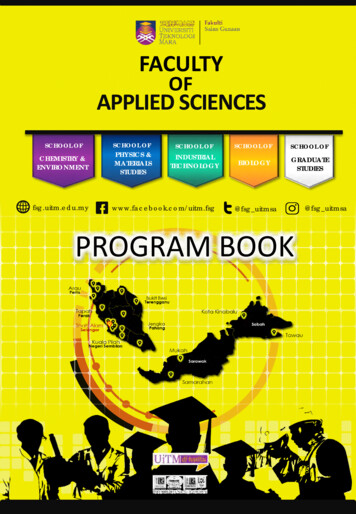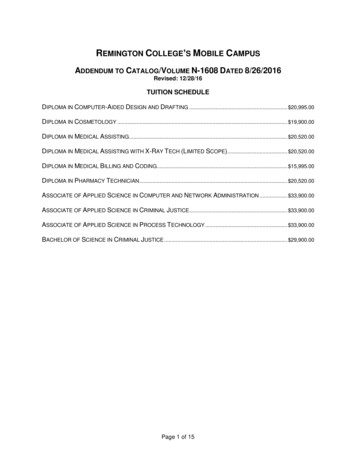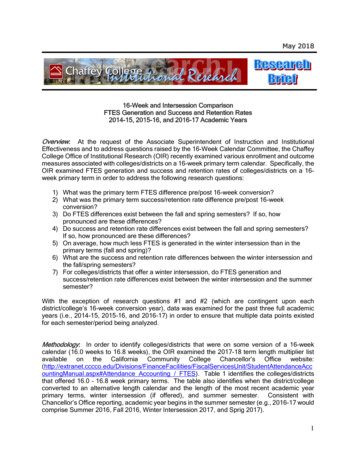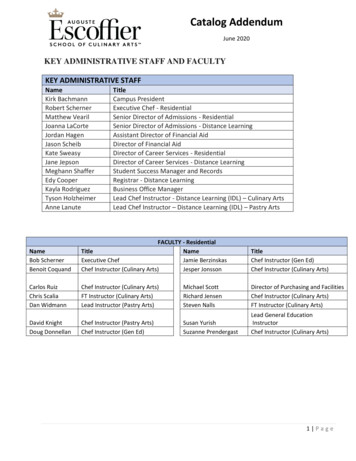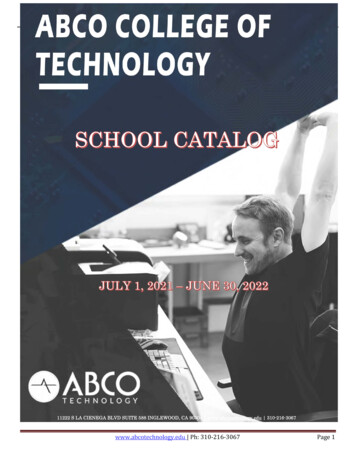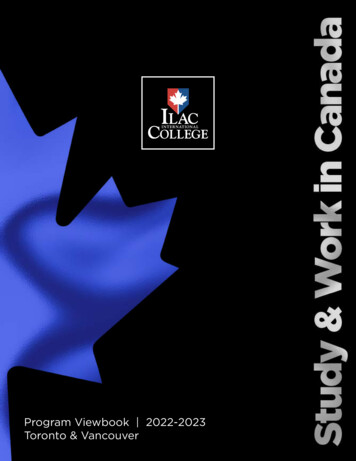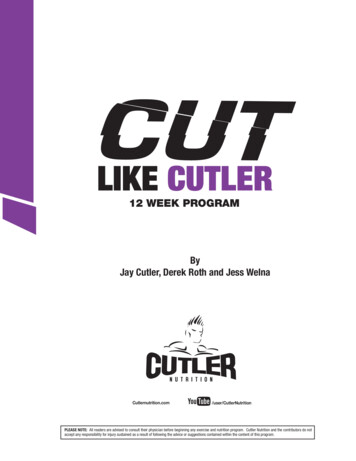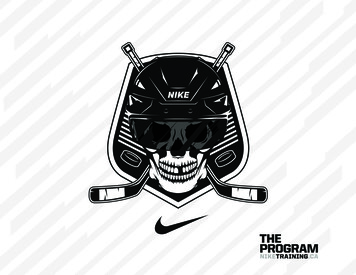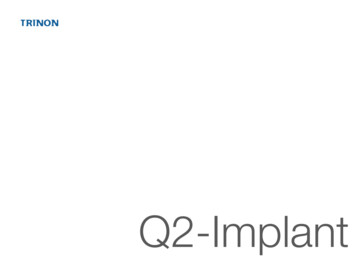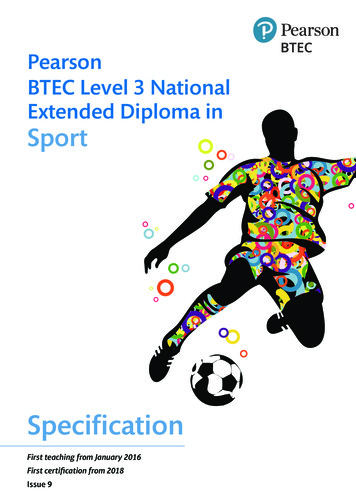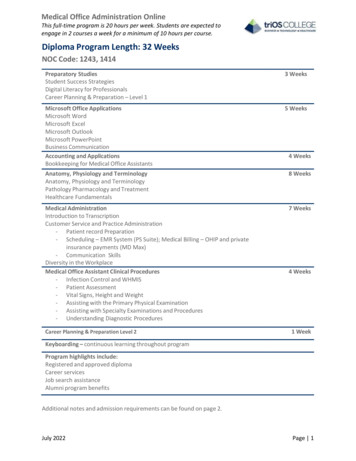
Transcription
Medical Office Administration OnlineThis full-time program is 20 hours per week. Students are expected toengage in 2 courses a week for a minimum of 10 hours per course.Diploma Program Length: 32 WeeksNOC Code: 1243, 1414Preparatory StudiesStudent Success StrategiesDigital Literacy for ProfessionalsCareer Planning & Preparation – Level 13 WeeksMicrosoft Office ApplicationsMicrosoft WordMicrosoft ExcelMicrosoft OutlookMicrosoft PowerPointBusiness CommunicationAccounting and ApplicationsBookkeeping for Medical Office Assistants5 Weeks4 WeeksAnatomy, Physiology and TerminologyAnatomy, Physiology and TerminologyPathology Pharmacology and TreatmentHealthcare Fundamentals8 WeeksMedical AdministrationIntroduction to TranscriptionCustomer Service and Practice Administration- Patient record Preparation- Scheduling – EMR System (PS Suite); Medical Billing – OHIP and privateinsurance payments (MD Max)- Communication SkillsDiversity in the WorkplaceMedical Office Assistant Clinical Procedures- Infection Control and WHMIS- Patient Assessment- Vital Signs, Height and Weight- Assisting with the Primary Physical Examination- Assisting with Specialty Examinations and Procedures- Understanding Diagnostic Procedures7 WeeksCareer Planning & Preparation Level 24 Weeks1 WeekKeyboarding – continuous learning throughout programProgram highlights include:Registered and approved diplomaCareer servicesJob search assistanceAlumni program benefitsAdditional notes and admission requirements can be found on page 2.July 2022Page 1
Medical Office Administration OnlineAdmission requirements: Canadian High School Graduation Diploma or Mature Student Status(Mature students from Ontario must be at least 18 years of age by the program start date andsuccessfully pass an academic achievement test. Mature students from other Canadianprovinces must be at least 19 years of age and a minimum of 1 year out of high school by theprogram start date and successfully pass an academic achievement test). Please contact us formore detail regarding admissions requirements for international students. In addition, anentrance examination must be successfully passed; demonstrated fluency in English (oral andwritten); and an Admissions Interview to determine suitability for a career as a Medical OfficeAdministrator.Accreditation policy: Like all post-secondary institutions in Ontario, triOS College reserves theright to accept or deny advanced standing into its program.Note: In order to continuously improve our programs, triOS College reserves the right to modifyprograms at any time. Program delivery order may vary depending on program start date. Thisdiploma program may not be available at all campuses. The program may have additionalreading weeks, depending on start date.You can find our key performance indicators (graduation rate, employment rate, etc.) atwww.triOS.com/kpi. These are older statistics from 2013.triOS College is registered and approved as a Private Career College under the Private CareerColleges Act, 2005.
Medical Office Administration OnlineCourse DescriptionsStudent Success StrategiesThis course stresses the importance of developing non-technical skills to enhance personal, academicand career success. The course will address strategies that are important for all adult learners, such asmanaging finances, maintaining health and wellness, understanding learning styles, setting goals, andhoning practical study skills, such as memory, reading, and test-taking techniques. In addition, thiscourse is designed specifically for the online learner. Therefore, the course emphasizes strategiesneeded to succeed in an online program, such as navigating technology efficiently, interacting andengaging with peers and facilitators, and managing learning time and space.Digital Literacy for ProfessionalsThis course introduces students to the fundamental concepts and principles of learning and working in adigital environment. This course will cover the following elements: using devices and handlinginformation, creating, and editing information, communicating, and collaborating, and being safe andresponsible online.Career Planning & Preparation - Level 1Career Planning and Preparation Level 1 introduces tools for a successful job search. The course will helpstudents maintain a career-focused approach throughout their academic program. Students will learnbasic career preparation skills, such as how to research opportunities, network for industry contacts anduse appropriate etiquette when communicating with prospective employers. Students will identify theirpersonal skills, values, and preferences for the workplace, begin preparation of a professional resumeand cover letter, and organize proof documents for their career portfolio. Asynchronous class discussionon the discussion board on various career-planning topics will round out this module. This course is apre-requisite for Career Planning and Preparation Level 2.Microsoft WordThis course is a combination of virtual training, projects, and exams in Microsoft Word. Skills coveredinclude formatting text for layout and appearance, formatting document parts, using styles, workingwith header/footer content, inserting and formatting tables, graphics, and pictures, and working withtemplates and themes.Microsoft ExcelThis course is a combination of virtual training, projects, and exams in Microsoft Excel. Skills coveredinclude working with workbooks and worksheets, inputting data, formatting cells, using functions andformulas, and creating and editing charts, tables, graphics, and templates.Microsoft PowerPointThis course is a combination of virtual training, projects, and exams in Microsoft PowerPoint. Skillscovered include the creation of attractive, professional-looking presentations, using and formattinganimations, transitions, pictures, audio, video, charts, tables, and incorporating speaker notes andannotations into presentations.July 2022Page 3
Medical Office Administration OnlineMicrosoft OutlookThis course is a combination of virtual training, assessments, and exams related to Microsoft Outlook.Skills covered include how to organize and manage communications, contacts, schedules, and tasks.Email and meetings are a major part of the professional world, learning how to compose, send, receive,store, and delete email messages, meetings, and appointments is crucial and covered in this module.Bookkeeping for Medical Office AssistantsThis course introduces fundamental bookkeeping principles and practices for Medical Office Assistants(MOAs). In this course you will perform basic bookkeeping procedures, be able to use basic bookkeepingterminology, and manage accounts receivable and accounts payable. You will be able to make journalentries and record transactions in the General Ledger. You will also learn basic information aboutcalculating sales tax, managing cash, reconciling banking, and managing purchasing and inventory. Youwill see how bookkeeping plays a part in the role of an MOA.Diversity in the WorkplaceThis course introduces diversity and its strengths in the workplace. Among the topics covered are thestrengths of diversity, its occasional challenges, how to manage diversity in the workplace, and the valueof diversity training. Diversity in group dynamics is also addressed, with an emphasis on the strengths ofa heterogeneous group and types of diversity.Business CommunicationThis course introduces basic understanding of communication skills in the business environment, withthe focus being on both written and spoken communication. Topics covered include critical reading andthe basics for effective written communication, effective spoken communication, oral presentation, andeffective agendas and minutes.Anatomy, Physiology and TerminologyThis course introduces the foundations of the language of medicine and will develop medical vocabularythrough the study of the structures and functions of the major body systems. Topics include medicalterminology, general body organization, and skeletal, muscular, cardiovascular, lymphatic, immune,respiratory, digestive, urinary, nervous (including special senses and psychiatric disorders),integumentary, endocrine, and reproductive systems.Pathology and PharmacologyThis course introduces pharmacology and the different classes of drugs and their use in the treatment ofa range of medical conditions. Routes of drug administration and drug effects are covered, as well asdiseases and diagnostic and treatment procedures relating to the major body systems with a focus onmedical terminology. After completing the course, students should be able to demonstrate knowledgeof common diseases and how they are diagnosed and treated.July 2022Page 4
Medical Office Administration OnlineHealthcare FundamentalsThis course introduces the medical office-assisting profession. Topics covered relate to the Canadianhealthcare system in general, including types of facilities and professions, and legal and ethicalconsiderations in the field. The roles and responsibilities of the MOA within the healthcare system areexplored.Introduction to Medical TranscriptionThis course introduces the process of transcribing medical dictation. Using transcription equipment tocreate a variety of clinical documents while managing challenges to dictation, such as accents,background noises, muffled speaking, voice recognition software, and so on. The development ofexcellent proofreading and editing skills is addressed.Customer Service and Practice AdministrationThis course introduces the administrative tasks of the healthcare environment and covers topics such asoffice communications and customer service skills, scheduling, preparing patient records, preparingagendas for meetings, and taking minutes. Topics also covered include healthcare funding in Canada,billing procedures for uninsured services, and third-party payers. Workplace skills, virtual assistant, therole of the clinical secretary, and some hospital procedures are also explored.Medical Office Assistant Clinical ProceduresThis course addresses the Medical Office Assistant’s role in clinical procedures commonly performed in amedical office. Clinical skills covered through demonstrations and labs include infection control andworkplace safety (WHMIS), prescription handling, diagnostic testing, and assisting with the patientexam.Career Planning & Preparation - Level 2This course builds on the concepts and skills introduced in Career Planning and Preparation - Level 1.Topics covered include how to conduct an effective job search and identify various methods of applyingfor work. Important career tools are the focus with the creation of a personal list of "Top Employers"and current industry opportunities, as well as finalizing a professional resume, career portfolio, andcareer correspondence. Interview skills explored and practiced are the identification of different typesand forms of interviews, responding to typical questions, evaluating job offers, and negotiating terms ofemployment. Self-management topics are reviewed with a focus on strategies for long-termprofessional success.July 2022Page 5
billing procedures for uninsured services, and third-party payers. Workplace skills, virtual assistant, the role of the clinical secretary, and some hospital procedures are also explored. Medical Office Assistant Clinical Procedures This course addresses the Medical Office Assistant's role in clinical procedures commonly performed in a
